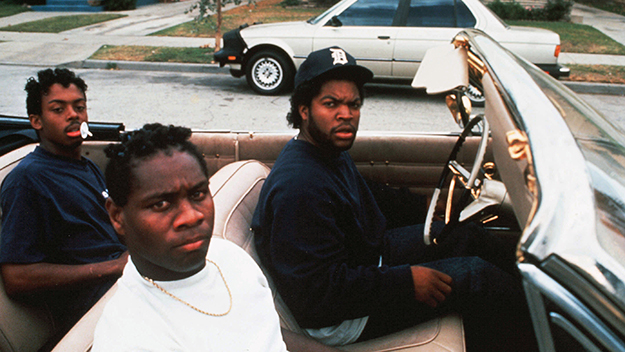News to Me: Biennials, Festivals, and Farewell to John Singleton

Boyz n the Hood (John Singleton, 1991)
1. John Singleton, director of Boyz n the Hood and many others, passed away last week. For Variety, longtime friend and collaborator Stephanie Allen remembers the time she first met Singleton—a young USC graduate cunningly using the conceit of a job interview to get his screenplay sold. Boyz n the Hood is currently playing at BAM as part of their Black 90s retrospective, discussed on this week’s podcast by programmer Ashley Clark and FC Editor-in-Chief Nicolas Rapold.
2. Kanopy is often touted as streaming’s best-kept secret: entirely free (with a library card) and filled with hidden gems (like 41 Frederick Wiseman films), it’s a Netflix-Criterion amalgam with no real downside. Or so we thought. Chris Cagle investigates the hidden costs of Kanopy (and questions who pays for them) in this piece for Film Quarterly, writing that the “oligopolistic market has accustomed users to cheap or ‘free’ content, but there are losers in that order of things.”
3. But if you still want to enjoy cinema that’s niche and free (from both guilt and a subscription fee), then check out the Franklin Furnace Digital Collections and Archives, home to a many number of avant-garde performance pieces, such as Debbie Moore’s Media and Explicit Sex Panel, #13 and Lawrence Graham-Brown’s Rites of Passage/Sacred Spaces/Sacred Spaces.
4. Not so long ago we crowned Lucrecia Martel’s Zama the Best Film of 2018. Recently, we’ve been revisiting translator Esther Allen’s comprehensive history of the film from The New York Review of Books, which focuses on the movie’s inspiration, its making, its differences from the novel, and what Martel wishes she had time to include. (For more Martel, check out two of her short films: Muta, meant in some vague way as an ad for Miu Miu; and Pescados, about talking fish.)
5. Jordan’s Wadi Rum (the Valley of the Moon) has a storied cinematic history, appearing in such films as The Martian, Prometheus, and, most famously, Lawrence of Arabia. Last month, it became home to the “Al-Qamar, Al Qamar” film festival, featuring 13 screenings over four days, as well as several other performances, conversations, and social events. Eliel Jones documents his visit to the desolate landscape over at Frieze, describing it as “a site where the world unfolds.”
6. The Whitney Biennial begins on May 17, and will this year feature Sky Hopinka as one of the curators for its film program. “This is a program that I’ve been working on for the last two or three years,” Hopinka told Hyperallergic. Titled What Was Always Yours and Never Lost, the program includes work by Thirza Cuthand, Caroline Monnet, Adam and Zack Khalil, Jackson Polys, James Luna, and the Colectivo los Ingrávidos.
7. “Though Riley’s film relies on an absurdist aesthetic, its relationship to human life is entirely rational, because it narrates the precarious reality of certain lives as a logical and very real extension of Western capitalist history.” Katherine J. Anderson writes “On the Absurdity of Ethical Capitalism” for Public Books, unpacking Boots Riley’s breakout film, Sorry to Bother You, in terms of race, class, and modern slave labor.
8. A retrospective of Bronx-born filmmaker Abel Ferrara’s nearly 50-year career has begun at MoMA, featuring such works as Bad Lieutenant, King of New York, and The Projectionist. Bedford + Bowery refer to that lattermost film as “a scrappy love letter to New York’s independent cinemas” in their piece on the Bijou—“an underground cruising spot that was one of the East Village’s best-kept secrets until it closed a week ago.”
9. A recent poll put together by World of Reel saw critics from all over weigh in on what they believe to be the best films of the past decade (the voters include Film Comment contributors Devika Girish, Michael Sragow, Chloe Lizotte, and Steven Mears). George Miller’s Mad Max: Fury Road topped the list, followed closely by The Tree of Life and Moonlight. But what do critics know about anything? This piece from The Times Literary Supplement laments the many, many times critics have been proclaimed dead and worthless (often by critics themselves).
10. Last up is none other than John Waters, featured here at the 2019 Lambert Family Lecture alongside author and critic Lynne Tillman. Though the two gathered to discuss the (recently concluded) gallery exhibition, John Waters: Indecent Exposure, the conversation veers all over—covering Andy Warhol, 9/11, Alvin and the Chipmunks, and the disappearance of weirdness. (Worth noting: Waters regularly publishes his Top 10 films over at Artforum. Last year, for his number one he chose Bruno Dumont’s Jeannette: The Childhood of Joan of Arc, which is set to see a sequel at Cannes later this month.)
We’ll leave you this week with a (kind of lo-res) meditation on the synoptic impulse in film criticism:







